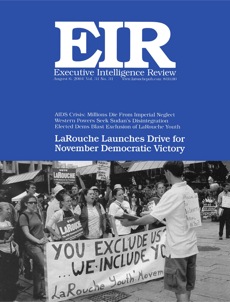LaRouche Launches Drive for Democrats To Win in November
by Jeffrey Steinberg and Nancy Spannaus
After the conclusion of the Democratic Convention in Boston, Lyndon LaRouche held a July 30 press conference to announce the formation of “LaRouche PAC,” a political action committee dedicated to assuring the crushing defeat of the Bush-Cheney Republican ticket in November. The only way this can be done, he said, is to return the Democratic Party to the tradition of FDR, and to implement LaRouche’s program for reorganizing the bankrupt global financial-economic system.
New LaRouche PAC Aims To Mobilize the Lower-Income 80% To Act
by Lyndon H. LaRouche, Jr.
LaRouche’s July 30 press conference.
LaRouche Issues His ‘Real Democratic Platform’: 50,000 Go Out at Boston
by Lyndon H. LaRouche, Jr.
LaRouche’s opening presentation to his July 25 webcast.
A Real Democratic Platform for November 2004
by Lyndon H. LaRouche, Jr.
Elected Dems Blast DNC Dirty Tricks Against LYM at Boston Convention
A July 25 press conference by the LaRouche Youth Movement and Democratic elected officials.
News Analysis
Western Powers Seek Sudan Disintegration
by Uwe Friesecke
The humanitarian crisis in the Darfur region confirms the cynical nature of the West’s Africa policy. For decades, the global financial institutions, led by the IMF and World Bank, blocked development for countries in the region, making social and political conflicts unavoidable.
Sudanese ‘Peace’ Deal Could Spell Disaster
by Muriel Mirak-Weissbach
Prof. Ibrahim A. Nasr El Din of Cairo University gave EIR a detailed briefing on four scenarios which could unfold in neighboring Sudan.
UNAIDS Conference Shows Bush Administration’s Imperial Attitude
by Colin Lowry
The Bush Administration cut the U.S. delegation attending the conference in Thailand by 60%, and reduced its contribution to the UN Global Fund for AIDS, Tuberculosis, and Malaria to just $200 million this year—one-fifth of what was requested by UN Secretary General Kofi Annan, to deal with the epidemic which took 3 million lives in the last year.
How Iraq Must, and Can, Become a Sovereign Nation Once Again
by Michael Liebig and Muriel Mirak-Weissbach
An interview with Jürgen Hübschen.
Philippines President Arroyo Stands Up
by Michael Billington
Her decision to withdraw the token Philippine military force serving in Iraq, more than a month before the scheduled end of their tour of duty on Aug. 20, came as a surprise to Washington, which is accustomed to subservience from Manila.
Army Whitewashes Abu Ghraib Torture Scandal
by Carl Osgood
The Army Inspector General’s report on detainee and interrogation operations in Iraq concluded that the abuses “were unauthorized actions taken by a few individuals.”
Congressional Closeup
by Carl Osgood
Interviews
Jürgen Hübschen
Colonel Hübschen (ret.) was an officer in the German Army for almost 40 years, and served as military attaché at the German Embassy in Baghdad. He has written several books on the history of the Mideast and on Western policy toward it.
Editorial
The Youth Are Your Future



